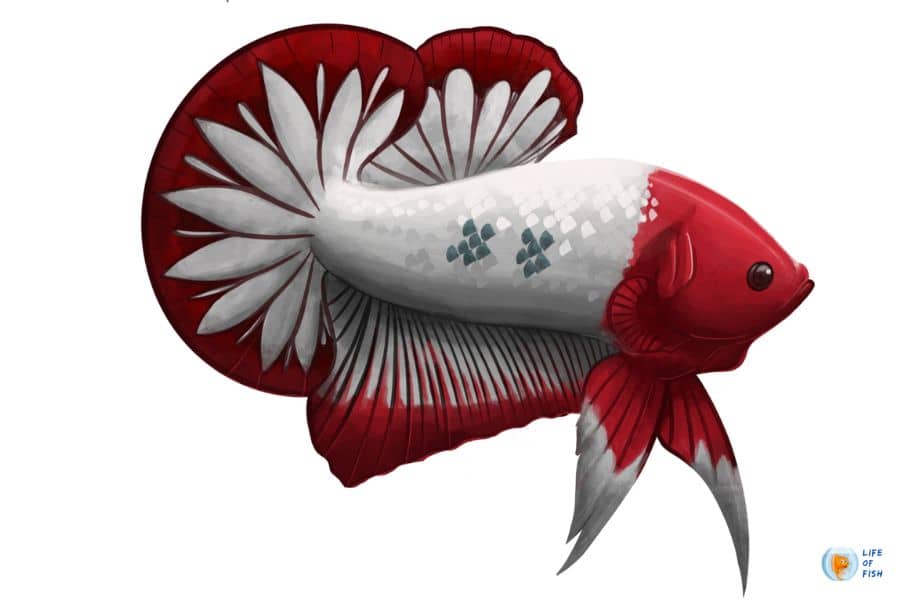As a betta fish lover, I’ve seen many cases of betta tumors throughout my life. While these growths are not uncommon, they can be a cause for concern among betta owners who want to ensure the health and wellbeing of their beloved fish.

In this article, I’ll provide an in-depth guide to betta tumors, including their causes, symptoms, and treatment options, as well as tips for preventing these growths from occurring in the first place. Whether you’re a new betta owner or a seasoned enthusiast, this guide will give you the knowledge and tools you need to keep your fish healthy and happy.
“Don’t let Betta Fish Diseases harm your beloved pets! Click here to learn how to keep your fish healthy and strong.” Betta Fish Diseases
Why betta owners need to be aware of this condition
Jump To
Tumors in bettas occur when cells divide uncontrollably and form lumps, usually on the head or body of the fish. Unfortunately, these lumps can become cancerous, leading to a host of health problems such as organ failure, infection, and even death. According to research conducted at the University of Veterinary Medicine Vienna (Vetmeduni), up to 10% of all bettas have been found to have some kind of tumor.
It’s important to remember that not all tumors are malignant, but it’s still essential to monitor your fish’s health and get them checked by a vet if any suspicious growths appear. Here are a few signs you should watch for:
- Unusual lumps or bumps
- Change in behavior or appetite
- Loss of energy or activity
- Laziness
- Difficulty swimming
If you do spot any of these symptoms, take your betta to the vet immediately. The earlier they begin treatment, the better chance they have of surviving and recovering from the illness.
Types of Betta Tumors
1. Cysts – These are small pore-like lesions found on their skin or fins. Though they don’t usually cause any health problems, it’s important to keep an eye out for signs of infection.
2. Tumors – Also known as neoplasms, these are noncancerous growths that may appear anywhere on the body. They’re typically caused by environmental factors such as poor water quality or dietary deficiencies.
3. Cancer – While cancers in betta fish are rare, some can develop malignant tumors. Symptoms include discoloration of the skin, loss of appetite, and lethargy.
4. Infections – Infectious diseases can also lead to tumors in bettas. Some common examples include bacterial infections, fungal infections, and parasites.
The symptoms of betta tumors
Betta tumors can be very serious and often cause a great deal of distress for both the fish and its owner. Symptoms of betta tumors include:
1. Unexplained swelling or lumps in various parts of the body.
2. Unusual behaviors, such as rapid breathing, loss of appetite, lethargy, or difficulty swimming.
3. Discoloration of the skin, fins, or eyes.
4. Bloody streaks or patches on the body, fins, or scales.
These symptoms are all signs that your betta may have a tumor and should be taken seriously. If you suspect that your betta has a tumor, it’s important to seek medical attention right away in order to get them the proper treatment they need.

Causes of betta tumors
Tumors in betta fish are like a ticking time bomb, as they can develop without warning or obvious cause. When it comes to understanding why tumors occur, the answer is complex and multifaceted – much like a puzzle with several pieces that must fit together. There are two main categories of potential causes: genetics and environmental factors.
Genetic factors relate to traits passed down from the parent fish, such as age, size, color, and even the type of disease they may be predisposed to. Environmental factors include things like diet and water quality, both of which can contribute to the development of tumors. Poor nutrition, for example, can weaken the immune system and make the fish more susceptible to illnesses, including cancer. Likewise, poor water quality can create an unhealthy environment where bacteria and parasites thrive, leading to infections and other health problems.
Provide tips on how to prevent betta tumors from occurring
Fortunately, there are steps you can take to prevent betta tumors from occurring. Firstly, feed your betta a balanced diet with plenty of proteins, vitamins, and minerals. Secondly, ensure your tank has good water filtration and perform regular water changes to keep it clean. Finally, look out for signs of ill health and treat any issues promptly. With the right care, you can give your betta a long and healthy life!
Diagnosis and treatment
Diagnosing a betta fish tumor is not always easy, and it can be difficult to tell if your beloved pet has one without the help of a veterinarian. However, there are some signs you can look for that will indicate the presence of a tumor. These include changes in color or texture of the skin, lumps or bumps, loss of appetite, and difficulty breathing.
Explain how to diagnose betta tumors
Once you have identified the possible presence of a tumor, consulting with a vet who specializes in fish health is crucial. They will be able to confirm the diagnosis and provide advice on the best course of action. There are a few different treatments available depending on the type and severity of the tumor:
- Surgical removal – This may involve removing the entire tumor and any surrounding tissue that might be affected.
- Medication – Depending on what kind of tumor it is, medication may be prescribed to reduce inflammation and pain.
- Radiation therapy – This involves using radiation to shrink the tumor and stop its growth.
No matter which treatment option you choose, it’s important to remember that these types of tumors can often recur. So, it’s essential to keep an eye on your betta’s health and watch out for any warning signs. With proper care and monitoring, your betta friend should make a full recovery!
Prognosis and aftercare
The outlook for betta fish with tumors can vary; depending on the size, location and nature of the tumor. It’s important to be aware that tumors in fish are often incurable and treatment may not be an option. However, there are steps you can take to ensure your betta fish is comfortable and has a good quality of life while they have their tumor.
guidance on how to care for a betta fish with a tumor
Here are some tips for managing your betta fish’s pain and discomfort:
- Make sure the water temperature is optimal for your betta fish – between 78°F and 82°F (26°C to 28°C).
- Feed your betta fish high-quality food sources like frozen blood worms or brine shrimp.
- Monitor your betta fish closely for signs of distress or any changes in behavior.

Conclusion
We’ve discussed the causes and symptoms of betta tumors, as well as some potential treatments. It’s a sad fact that these tumors are all too common in domesticated betta fish – but there is hope! By providing your betta with a clean habitat, avoiding overfeeding and supplementing their diet with vitamins, you can help to prevent tumors from developing. If your betta does start displaying any signs of a tumor, it’s important to take action quickly and seek treatment right away.
In closing, here’s a 4-point checklist for keeping your bettas healthy:
1. Provide them with a clean habitat
2. Avoid feeding them too much food
3. Supplement their diet with vitamins
4. Act promptly if they show signs of a tumor
By following this simple advice, you’ll be doing your best to keep your betta happy and healthy. Thanks for taking the time to learn about betta tumors today – we hope you found the information useful!
Read Next: Betta Swim Bladder Disease: Causes And Treatments
Read Next: Betta Lice 101: Everything You Need to Know
